‘If you choose, will it be forever?’ Vic van Dijk, PhD candidate on membrane technology, philosophizes about the idea of ever having to choose between a career in chemistry or in politics. ‘You can always go back if you choose, but you will miss out on crucial developments. For the time being, I’ll just keep all my options open.’
This is how Vic ended up discussing sustainability in the city council on one day, while soaking polymer pieces in a chemical solution the next. ‘I guess I have many interests.’
In his research, Vic is optimizing the adsorption capacity of silica coating on membranes, which makes the filtering of fluids much more effective. This appears to be a surface question. Vic: ‘You want to have as much silica coating as possible where the fluid can pass onto, because the fluids touch more of it and the silica’s adsorptive capacity can do its work. If you use nano-particles of silica to put this coating on the inside of the pores of membranes, you can significantly increase the surface and thus have better filtering results.’ It’s Vic’s goal to discover how to manipulate the nano-particles to get maximum leverage.
Vic’s work can be considered fundamental. At the same time, however, he is fascinated with how all of this translates into daily practice. Vic gives an example of how his research can benefit food and beverage processing: ‘Beer needs to be filtered during production, to take out the yeast and other substances to increase shelf life. At present, brewers usually have to add and take out ‘silica-powder’ to do this filtering. However, direct contact with dry silica could be hazardous. If we can fix the silica on membranes, the process would be much safer.’
Vic’s plans with his research findings go beyond food processing and filtering, though. ‘Wouldn’t it be great if we could add a catalyst on the nano-particles? Such a technology could turn harmful substances into safe ones. Imagine the possibilities and implications! We could, for instance, turn remains of medicine in drinking water into nontoxic fluids.’
‘I get to improve the city’
Another thing that Vic could imagine, is what Enschede should look like in the year 2050. After having had a position in the University Council, in the board of the Student Union and being an active member of D66 for a while, the researcher got elected into the city council this year. ‘I get to improve this city! I believe that Enschede can be fully sustainable in 2050. By that, I also mean financially.’
On shorter notice, however, Vic has additional priorities: ‘I noticed that students are not always regarded as full inhabitants of Enschede when it comes to political discussions.’ The researcher establishes that there is a lack of much-needed vision on student accommodation. On top of that, the permit-situation is confusing. This makes it hard for students to find good housing. Vic: ‘We need to talk with the student bodies to solve such issues together. How can we make sure that students mingle with other inhabitants? How much growth is possible?’
It seems like there are many things to do for Vic, and many choices to make. But choosing between science and politics isn’t one of them.







